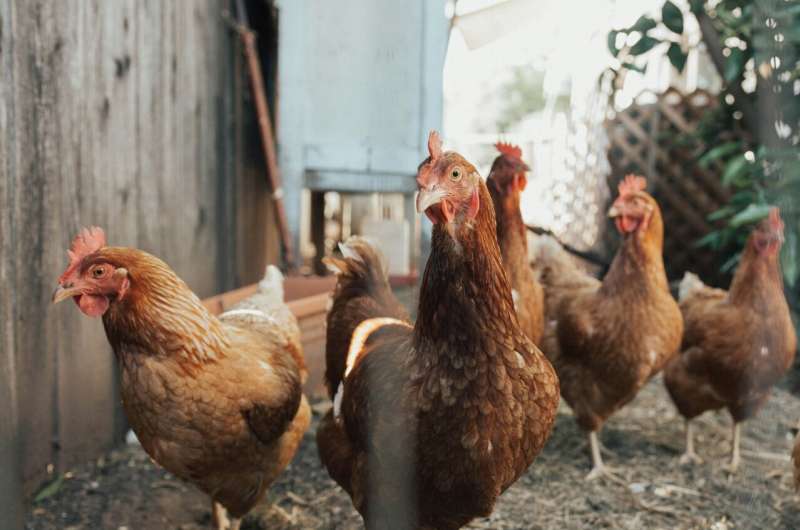Science
New Study Reveals Antimicrobial Peptides Combat Salmonella in Chickens

A recent study has demonstrated that antimicrobial peptides can effectively combat Salmonella infections in chickens, presenting a promising alternative to traditional antibiotics. This research highlights the potential of these peptides to enhance food safety and public health. The findings were published in the journal Microbiology Spectrum on November 3, 2025.
Gireesh Rajashekara, BVSc, Ph.D., a Professor and Associate Dean for Research and Advanced Studies at the University of Illinois Urbana-Champaign, led the study. He emphasized the importance of antimicrobial peptides, stating, “These peptides have the potential to be alternatives to antibiotics and thereby could mitigate antibiotic resistance.” The ability of these peptides to target not only Salmonella but also related pathogens like E. coli underscores their significance in controlling a wide range of bacterial threats.
Salmonella is a leading cause of foodborne illness in the United States, with chicken and chicken products being primary sources of human infection. The researchers sought to identify effective alternatives to antibiotics for managing this pervasive issue in poultry. Antimicrobial peptides, which are short chains of amino acids, can eliminate harmful bacteria without contributing to antibiotic resistance.
In the study, researchers discovered a specific set of antimicrobial peptides capable of killing various Salmonella strains in laboratory conditions. They further confirmed these peptides’ effectiveness in chickens, demonstrating their ability to reduce Salmonella loads significantly. The antibacterial action of the peptides is believed to stem from their interaction with the membranes of Salmonella cells.
The study revealed that these antimicrobial peptides maintain their activity even when exposed to heat and protease treatments, qualities essential for their application in the poultry industry. Rajashekara remarked, “We identified two antimicrobial peptides that kill many different types of Salmonella and also reduce Salmonella load in chickens.” This breakthrough could pave the way for new strategies to enhance food safety across the industry.
Looking ahead, the research team aims to conduct large-scale tests of these peptides in chickens. They plan to optimize the methods for delivering these peptides through water or feed and to deepen their understanding of how these peptides kill Salmonella. Additionally, they will explore other peptides with similar anti-Salmonella properties.
This study not only provides insights into alternative methods for controlling Salmonella in poultry but also contributes to the broader goal of improving public health through innovative approaches to food safety. The findings hold significant implications for the poultry industry and food safety practices globally.
For further details, the full study is available in Microbiology Spectrum at doi.org/10.1128/spectrum.01848-25.
-

 Science3 weeks ago
Science3 weeks agoResearchers Challenge 200-Year-Old Physics Principle with Atomic Engines
-

 Politics1 week ago
Politics1 week agoHamas Chief Stresses Disarmament Tied to Occupation’s End
-

 Science1 week ago
Science1 week agoOhio State Study Uncovers Brain Connectivity and Function Links
-

 Entertainment1 week ago
Entertainment1 week agoSyracuse Stage Delivers Lively Adaptation of ‘The 39 Steps’
-

 Top Stories1 week ago
Top Stories1 week agoFederal Agents Detain Driver in Addison; Protests Erupt Immediately
-

 World3 weeks ago
World3 weeks agoGlobal Military Spending: Air Forces Ranked by Budget and Capability
-

 Politics2 weeks ago
Politics2 weeks agoNHP Foundation Secures Land for 158 Affordable Apartments in Denver
-

 Lifestyle1 week ago
Lifestyle1 week agoTrump’s Push to Censor National Parks Faces Growing Backlash
-

 Politics1 week ago
Politics1 week agoNFL Confirms Star-Studded Halftime Show for Super Bowl LVIII
-

 World1 week ago
World1 week agoBoeing’s Aircraft Production: Assessing Numbers and Challenges
-

 Top Stories1 week ago
Top Stories1 week agoWill Smith Powers Dodgers to World Series Tie with Key Homer
-

 Entertainment1 week ago
Entertainment1 week agoMegan Thee Stallion Exposes Alleged Online Attack by Bots









